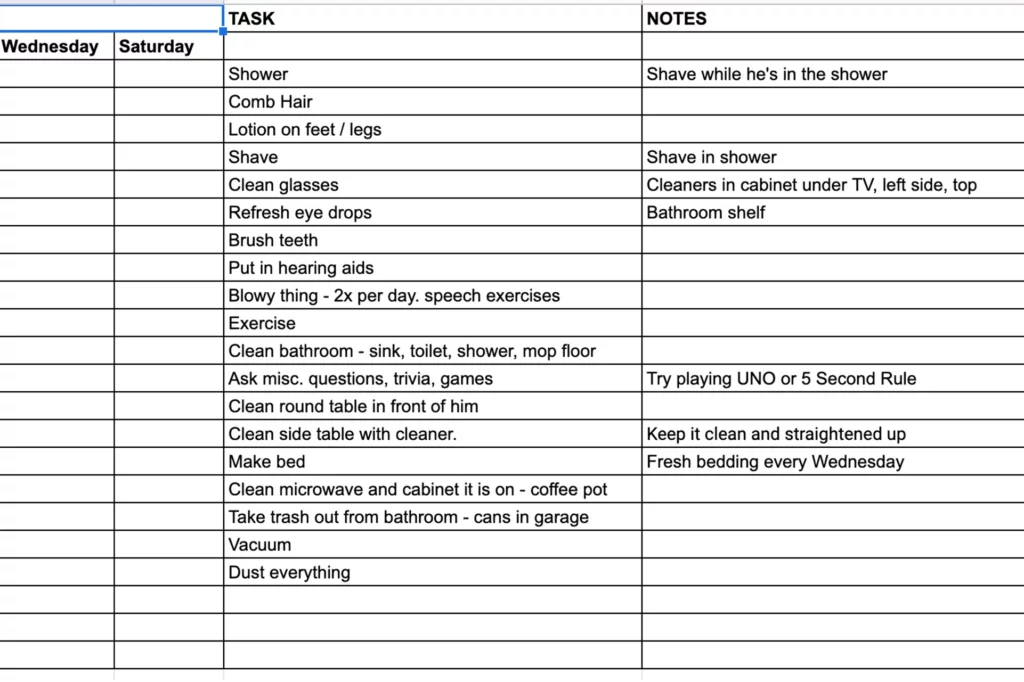
Home Health Aides for Dementia Patients: EVERYTHING you Need to Know
This post may contain affiliate links or Google Ads and we may earn a small commission when you click on the links at no additional cost to you. As an Amazon Affiliate, we earn from qualifying purchases. This is at no additional cost to you and helps with our website expenses.
If you are the primary caregiver for someone with Lewy Body Dementia or Alzheimers, you may be considering hiring home health aides for dementia. Home health aides can provide much-needed support and relief for caregivers. In this article, we will discuss the benefits of home health aides and what to look for when hiring one. We will also provide tips for managing caregiving duties alongside an aide, who pays, and more. Read on to learn more!
How to choose the right home health aide for dementia?
When a loved one has been diagnosed with dementia, it can be a difficult and daunting task to choose the right home health aides for dementia. With so many options available, it is important to take the time to research and compare different agencies and aides.

There are a few key factors to consider when making this decision. First, if you are using an agency, it is important to choose an agency that is experienced in working with patients with dementia. The staff should be trained in dealing with the unique challenges that come with the condition.
In addition, the agency should be able to provide a comprehensive care plan that is tailored to the individual needs of the patient. Finally, it is important to select an aide who is patient and compassionate.
Dementia can be a very trying condition, especially Lewy Body Dementia, and it is important to have someone who can provide care and support during this challenging time. By taking the time to consider all of these factors, you can be sure to choose the right home health aide for your loved one.
Don’t think you have to use the first home health aide that an agency sends or you find privately. Don’t hesitate to ask for a new aide if it is not a good fit. Just like any profession, there are good, bad, and mediocre ones. It may take several tries to find an aide that is best for your situation.
We’ve gone through many health aides. Frankly, some of them were so bad that they didn’t last one day. After multiple tries, we’ve found one that is a perfect fit for us. She has become like family.
Author
How do home health aides help people with dementia live safely and comfortably in their own homes?
Home health aides provide essential care and support for people with dementia. By helping with activities of daily living, such as bathing, dressing, and eating, they enable people with dementia to live safely and comfortably in their own homes. In addition, home health aides can provide valuable assistance with medications and other treatments.
They can also help to monitor changes in a person’s condition and report them to the primary caregiver. As a result, home health aides play a vital role in helping people with dementia live as independently as possible.
What are some common duties?
Home health aides play an important role in providing care for elderly or disabled patients. One of the most common duties of a home health aide is providing personal care, such as bathing, dressing, and grooming. In addition, home health aides may also help with light housekeeping tasks, such as laundry and meal preparation. Another important duty of a home health aide is providing companionship and emotional support to patients. This can be especially important for patients who suffer from dementia or other mental health conditions.
Home health aides can provide much-needed conversation and social interaction, helping to reduce feelings of isolation and loneliness. In some cases, home health aides may also be responsible for providing transportation to appointments or other activities. By performing these essential tasks, home health aides play a vital role in the lives of their patients.
10 Duties that a Home Health Aide can Provide
- Bathing. This can range from supervising bathing that they can do on their own still to complete bathing or showering, even bed baths.
- Dressing. A home health aide can be a big help in dressing someone with dementia. Forgetting how to put on clothes or what item goes where happens with dementia. Aides can supervise and instruct or do complete dressing.
- Feeding. As dementia progresses swallowing and eating can become more difficult. An aide can help by cutting foods into smaller pieces, serving finger foods, providing thickened liquids, pureeing food, and using eating utensils for the person.
- Grooming. Your loved one with dementia may not be able to perform everyday tasks like combing their hair, brushing their teeth, putting lotion on, etc. A home health aide can help with all grooming tasks.
- Laundry. The aide can wash, dry, and put away clothes for the person with dementia.
- Light cleaning. This can include dusting, cleaning the bathroom, keeping trays sanitized, washing dishes, changing bed sheets, taking out trash, de-cluttering, vacuuming and sweeping, and more.
- Shopping. An aide can do the shopping for food and other items needed. They might go alone or take the person with dementia with them.
- Bathroom help. If the person with dementia needs help going to the bathroom the aide should help with this. This includes wiping and cleaning them. If they are incontinent an aide should help with changing adult diapers and cleaning.
- Companionship. A home health aide provides companionship to a person with dementia. This can involve engaging the person in activities such as reading, playing games, or talking. The goal is to provide social interaction and stimulation that can help improve the person’s mood and cognition.
- Transportation. Traveling to doctor’s appointments, to the store, or even going for a drive are services that a home health aide can provide. There may be additional payments needed for this to cover the car expenses.

How can families ensure they are hiring the best possible home health aide for their loved one with dementia?
One of the best ways to ensure that you are hiring the best possible home health aides for dementia is to conduct a thorough interview. During the interview, be sure to ask the candidate about their experience caring for people with dementia, as well as what methods they use to manage difficult behaviors.
It is also important to ask the candidate how they would deal with a situation in which your loved one became agitated or violent. Furthermore, you should make sure that the candidate is comfortable working with other members of your care team, such as physicians and nurses. By taking the time to conduct a thorough interview, you can ensure that you are hiring the best possible home health aide for your loved one with dementia.
If you are hiring through an agency, they will most certainly have background checks performed. If you are privately hiring, be sure to have a background check done to ensure you are hiring someone with no criminal background.
What should families expect from a home health aide’s care plan for someone with dementia?
Home health aides who care for patients with dementia face a unique set of challenges. The disease can cause symptoms like memory loss, confusion, and changes in mood and behavior, which can be difficult for caregivers to manage. As a result, it is important for home health aides to develop a care plan that is specifically tailored to the needs of their patients. The care plan should take into account the individual’s symptoms and be designed to help them maintain as much independence as possible.
In addition, the care plan should be flexible enough to accommodate changes in the individual’s condition. By taking these considerations into account, home health aides can develop a care plan that provides the best possible quality of life for their patients.
How much does it cost to hire a home health aide for someone with dementia?
The cost of hiring a home health aide to care for a loved one with dementia will vary depending on a number of factors, including the severity of the condition, the number of hours of care needed, and the geographic location.
In general, however, private pay rates for home health aides range from $15 to $25 per hour. Hiring through an agency is considerably more than that. But remember they are taking care of all taxes and reporting to the state and IRS. Don’t forget, if you are privately paying you still have to pay taxes for the employee.
How do I find a home health aide in my area?
There are a number of ways to find a qualified home health aide, including searching online directories or contacting local home care agencies. Websites like care.com have many people looking for work as aides.
When interviewing candidates, be sure to ask about their training and experience in caring for people with dementia. It is also important to discuss your loved one’s specific needs and create a detailed care plan. Once you have selected a home health aide, be sure to stay in communication and regularly check in on your loved one’s well-being.
Should you use an agency or private pay?
When hiring a home health aide, families have the option of going through an agency or hiring a private pay worker. There are pros and cons to both approaches. Working with an agency can be more expensive, but it also provides more peace of mind. The agency will likely do a background check on the aide and will be responsible for finding a replacement if the original worker is not a good fit. In addition, agencies typically offer some level of insurance in case the aide is injured on the job.
Private pay arrangements are often less expensive, but they also come with more risk. Families who go this route will need to do their own vetting of potential aides and will be responsible for finding a new worker if the arrangement doesn’t work out.
It’s important to weigh all of these factors before making a decision. Families should also be aware that there are other options, such as hiring a live-in aide or working with a shared services model. Ultimately, there is no one-size-fits-all solution when it comes to hiring a home health aide. Families should carefully consider their needs and budget before making a decision.
Does Medicare pay for home health aides?
Medicare is a federal health insurance program that provides coverage for people 65 and over, as well as those with certain disabilities. Home health aides provide a range of services to help people with everyday tasks, such as bathing, dressing, and eating. Medicare does not cover the cost of home health aide services on a regular basis. However, it will pay for these services if they are considered medically necessary and are part of a plan of care that has been approved by a doctor.
Medicare will also cover the cost of home health aides if the patient is enrolled in a hospice program. In general, Medicare does not cover the cost of long-term care services, such as those provided by home health aides. However, there are some exceptions to this rule, so it is always best to speak with a Medicare representative to learn more about what is covered.
Does Medicaid pay for home health aides?
Medicaid is a government-funded health insurance program that provides coverage for low-income individuals and families. One of the benefits of Medicaid is that it generally pays for home health aides.
In order to be eligible for Medicaid coverage of a home health aide, you must be receiving care from a Medicaid-certified home health agency. If you have questions about whether your home health agency is Medicaid-certified, you can contact your state Medicaid office. Once you have verified that your agency is Medicaid-certified, you can begin the process of finding a home health aide who meets your needs.
Here is a link to an NPR article about Medicaid and home health aides.
The VA can Help Pay for Home Health Aides for Veterans
The Veterans Health Administration offers a variety of home healthcare services to eligible Veterans. These services can be provided through either the Home Based Primary Care program or the Community-Based Outpatient Clinics. Services may include personal care, homemaking, respite care, and medical social work.
In order to be eligible for these services, Veterans must be enrolled in the VA healthcare system and be able to demonstrate a need for home healthcare services. For more information on eligibility requirements and the programs offered by the VA, please visit their website or contact a local VA office.
The Program of Comprehensive Assistance for Family Caregivers (PCAFC) pays for family members to provide home healthcare to their Veterans. Read more about this here.
Do Home Health Aides need any certifications?
Although certification is not required for all home health aides, many employers prefer or require aides to have some formal training. There are a variety of certifications available, and the requirements can vary depending on the state in which you work.
Some common certification programs for home health aides include the Certified Nurse Assistant (CNA) program, the Home Health Aide (HHA) program, and the Personal Care Assistant (PCA) program. Each of these programs has different requirements, but all typically involve completing a certain number of hours of training and passing a final exam.
Even though certification is not required for all home health aides, it can be beneficial in terms of job security and earning potential. In addition, many patients feel more comfortable working with an aide who has been formally trained.
Problems you can have with Home Health Aides
For many people, home health aides are a vital part of their care team. However, there can be some problems with home health aides. For example, they may sleep on the job, or be on the phone instead of taking care of their patients. They may also fail to show up for their shifts, or be otherwise unreliable.
While these problems can be frustrating, it is important to remember that not all home health aides are like this. There are many reliable and hardworking home health aides who provide great care for their patients.
If you are having problems with your home health aide, talk to your agency or another member of your care team. They may be able to help you find a more suitable home health aide who will better meet your needs. If you are privately paying your aide, you may want to look for another aide.
Although we have a wonderful home health aide now, it wasn’t easy finding her and we went through many before finding the right one. We had an aide that fell asleep 10 minutes after she got here. One actually yelled at me for not letting her study for hours while she was at our home. Others were notoriously late or no-shows. Keep trying till you find an aide that you like.
Author
In conclusion. Dementia is a growing concern for seniors and their loved ones. Home health aides can provide much-needed assistance and support for people with dementia, helping them to live safely and comfortably in their own homes. If you are considering hiring a home health aide for a loved one with dementia, it is important to do your research to ensure you are hiring the best possible person for the job.
The tasks of a home health aide vary depending on the needs of the individual but may include providing medication reminders, help with grooming and bathing, light housekeeping duties, and more. Families should expect to have regular communication with the home health aide about care plan updates and changes.
Have you or someone you know hired a home health aide? Share your experiences in the comments section below.




